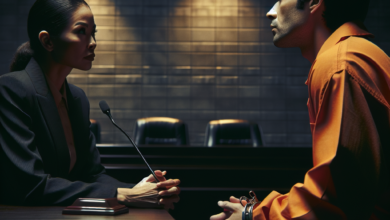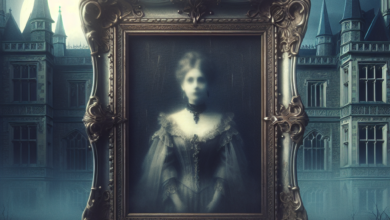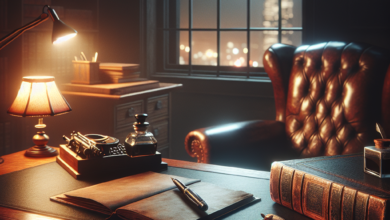Secrets of the Crime Scene
In the city of Eldridge, fog rolled off the river like the whispered secrets of an old graveyard. The streets were slick with rain, and streetlights flickered as if trying to remember the last time they had shone. It was on this particular night that a young woman named Clara Witherspoon found herself entangled in a mystery that would unravel the very fabric of her small community.
Clara was a graduate student in criminology, her nights often spent hunched over textbooks and case files in the university library. She had an insatiable thirst for the truth, a drive that stemmed from her childhood fascination with true crime novels. But it was also fueled by an unresolved tragedy in her life—the disappearance of her younger brother, Ethan, when they were teenagers. She couldn’t shake the feeling that he was somehow connected to the dark underbelly of Eldridge.
As Clara glanced out her window, she spotted the flashing blue and red lights of a police cruiser illuminating the street below. A swarm of officers crowded near a building at the end of the block, their serious faces lit by the glow of their radios. Curious, transparent envelopes of matter floated through her mind: something had happened, something bad. With a heart pounding in her chest, she grabbed her coat and stepped onto the cold pavement.
The scene was chaotic, yet eerily orderly, as police officers cordoned off the area. Clara knew one of the detectives on the scene—Detective Marcus Hale. He’d always been a steadfast figure in her life, having been a friend of her parents. As she approached the crowd, she found him crouched over something near the pavement.
“Clara, what are you doing here?” he asked, straightening up, concern etched into his features. “You shouldn’t be here. It’s not safe.”
“I can help, Marcus. Please,” she insisted, her curiosity piquing louder than his concern. “What happened?”
He hesitated, eyes flitting over the officers bustling around him. Finally, he gestured for her to come closer. “We found a body. Seems like foul play.”
Clara’s stomach dropped. “A murder?”
“More than likely. The victim’s a woman in her early thirties. We’re still identifying her.” Handing her a pair of gloves, he added, “Just don’t touch anything.”
Donning the gloves, Clara stepped closer to the scene. The body lay sprawled against the cobblestones, draped in a white sheet that fluttered slightly with the evening breeze. An unassuming sack of secrets; she felt a pull towards the mystery held beneath, a spark of adrenaline igniting her need to piece everything together.
“Who is she?” Clara asked, scanning the gathered crowd for any sign of recognition.
“We’re working on it,” Marcus said, his brow furrowing. He looked conflicted—torn between his role as a protector and his respect for Clara’s pursuit of knowledge. “Her purse is missing, and we’ve found signs of a struggle nearby.”
Clara’s eyes darted to a nearby alley, its darkness thickening with the night. A gust of wind sent a shiver through her bones, but within that chill, a message seemed to echo. She could almost hear Ethan’s voice, encouraging her to follow the trail, to uncover whatever lay beneath.
“Have you checked the alley?” she prompted, unable to suppress the thrill of potential discovery.
“Not yet; we’re still securing the area. Whatever you think you can do here—”
“I know how to analyze a crime scene, Marcus. I’ve been studying this for years. Let me help you, please.”
He sighed, relenting under the weight of her determination. “Fine, but stay close and make sure to keep your thoughts to yourself until we’re done.”
Beneath the shadows of the alley, Clara spotted something glinting among the wet pavement—a shard of glass. She knelt to inspect it, the light from the streetlamps casting a silvery hue over the scene.
“Is this from her purse?” Clara asked, holding the shard up to the light. She could almost see a ghost of a clue, lingering just beyond reach.
Marcus frowned, taking the shard from her. “Maybe, but we still need to gather evidence. Keep looking.”
While officers began to conduct interviews with witnesses who had gathered, Clara moved deeper into the alley, her instincts guiding her. Near a more secluded corner, she found footprints—fresh indentations in the mud. Bending lower, she recognized the distinct pattern of a designer shoe, too pristine for the slums that creaked and groaned under an oppressive layer of forgotten dreams.
“Marcus!” she called, beckoning him. “You need to see this.”
He joined her swiftly, squinting at the ground. “Those have to be new. We’ll have them analyzed.” His voice brimming with cautious excitement, he continued, “This could lead us to the suspect.”
“This alley could be a prime location for the struggle,” Clara suggested, her fingers tracing the cool, damp surface of the brick wall beside her. “Maybe there’s something more hidden—a personal item, or even—”
“Clara, focus,” Marcus cut in, his tone turning more serious. “We need to stick to the facts, not gratuitous theorizing. Correct citations matter.”
“I know, but if we can understand who she is and what happened, maybe we can understand why she was attacked.”
“You might have a point. But we need hard evidence, not assumptions.”
Determined, Clara resumed her search while Marcus relayed details to his team. Her instincts prickled as she glanced about. The shadows seemed to dance and twist, beckoning her into depths unknown. She turned when something caught her eye—an iridescent glint near a darkened recess at the wall.
Kneeling down, she uncovered what appeared to be a gold pendant—a tiny locket, half-buried in the wet earth. Flipping it open, she found a photo of a smiling woman in a sunlit field. Clara recognized her immediately; she had seen this girl in the local café many times, often sketching in her notebook.
“What have you got there?” Marcus asked as he stepped closer.
“A locket,” Clara said, holding it out for him to inspect. “It looks like it belongs to the victim.”
“Could be.” He took it carefully, his brow furrowing. “We’ll need more than just a locket. But this does give us a name.” He reached for his radio to call for the forensic team to arrive on-site.
Within the hour, the grey-blue light of dawn began creeping over the horizon. Clara shivered as the night’s chill began to dissipate, replaced by a heavy anticipation thick in the air. When the coroner arrived, they began their solemn work, taking the body away with medical detail.
“Do you think it was premeditated?” Clara hesitated, glancing at Marcus, who leaned against the car, deep in thought.
“Hard to say, but the choice of location and lack of stolen belongings suggest someone knew her. Possibly a crime of passion,” he replied, rubbing his temples. “We’ll know more once we find out who she is.”
Days lingered as the investigation gained traction. The victim’s name was revealed to be Sarah Klein, a freelance artist known for her whimsical murals throughout Eldridge. As local media spread the word, Clara couldn’t help but feel an odd sense of familiarity. Each mural represented a piece of hope for the community; the loss was profound.
With Marcus’s encouragement, Clara offered to gather background information about Sarah, plunging into the artist’s life. Hours spent combing through social media led her to discover Sarah had a passionate following who admired her vibrant art and reflective personality. Yet, creeping through the follies of curated life, Clara uncovered something darker—a series of heated exchanges with a local art critic, Michael Grant, who had publicly ridiculed Sarah’s work.
Clara’s instincts screamed to dig deeper. Shaking with both excitement and trepidation, she reached out to the cafe where Sarah frequented, narrowing down a potential meeting with several local artists who may have known her deeply.
“Clara, you need to be careful,” Marcus cautioned as they conducted interviews with Sarah’s friends. “We can’t make accusations without solid proof.”
“I’m not accusing anyone. But there’s something about Michael I don’t trust.” Clara’s voice carried an unwavering certainty. “He had a motive. If Sarah’s work flourished and his critiques faded into obscurity, what would that do to his career?”
The art community turned out to be a tight-knit circle, and whispers followed Clara as she delved deeper into Sarah’s world. A cryptic conversation with one of Sarah’s friends, a fellow artist named Jenna, revealed something troubling.
“She had been receiving threatening messages lately,” Jenna murmured, her face pale. “I thought it was just some troll, but now I don’t know…”
Clara’s pulse quickened; threats pointed in one direction. By the end of the week, she had compiled a dossier connecting Michael to Sarah’s art, volatile emotions, and documented confrontations.
“The media latched onto it after her death,” Clara explained to Marcus as they scanned through her findings. “This could have pushed him into a corner.”
“Let’s see if we can bring him in for questioning,” Marcus decided, a hint of urgency painting his voice. But their caution prevailed; the investigation wasn’t as straightforward as it seemed.
Pencil sketches gave way to muddy layers of deceit; agents of chaos rallied against them and swirling pools of dark rumors haunted the art community. Clara, now neck-deep in the case, faced pressure from both law enforcement and the community as demands for justice roared like a storm.
One afternoon, Clara received a call that rattled her to the marrow. A witness—an elderly man who lived near the alley where Sarah had been found—claimed to have seen someone leaving the scene that night. The man was frail, shaking as he recounted the event, his memories foggy, yet fragments of clarity emerged.
“I saw you there, the night…” he paused, gazing past Clara as if wrestling with the weight of memory. “The man had a red scarf. Beautiful scarf…something about it struck me.”
“Where did he go?” Clara pressed on, hope flaring.
“He walked toward the river… then I saw him disappear.” The man trembled as if recalling a haunting image. “But I’m not sure who he was.”
Clara’s heart raced. The river was an expanse of history, filled with many secrets—perhaps even the key to unlocking this gruesome puzzle. Her thoughts spiraled as she clutched the phone tight against her ear, already spinning a plan at the edges of her mind.
“We need to find that scarf. It could tie everything together,” she told Marcus, who listened with fevered anticipation.
“Let’s check the riverbank,” he agreed, rallying his team. “If this leads us to the killer, we might unravel their motives too.”
That night, the river glistened under the ghostly glow of twilight. Clara stood at the edge, breathless from anticipation tinged with unease.
“Look!” Marcus pointed. “Footprints.”
Disturbed mud led toward the tangled flora along the bank, and Clara’s pulse quickened at evidence of hurried escape. Kneeling down, she spotted a fragment of bright red caught among the twisted roots.
“It’s the scarf!” Clara gasped.
“Be careful…” Marcus warned, as Clara reached for it, evidence intertwining like threads of fate. A sense of urgency surged through her as she stood, scarf in hand.
“Now we just need to match this to someone,” Marcus said, his brow emerging from its permanent crease. “Let’s see where this leads us.”
But as they rushed back to present their findings, Clara felt a pang—nobody who stood at the river could possibly understand what it meant to linger amidst truths now clutched in her hand. Each twist of fate throbbed with unspoken resolutions, both unbearable and liberating.
In the following days, Clara and Marcus built a case against Michael Grant. The deeper they dug, the more evidence surfaced—Jane’s testimony, the troubling exchanges, the scarf tying Michael to Sarah. The layers of secrets began peeling as they prepared for confrontation.
One damp afternoon, Clara and Marcus invited Michael for an informal meeting under the pretext of discussing Sarah’s art.
“You boys are here for the next critique on her work?” Michael’s sardonic smirk hung in the air. His demeanor was confident, perhaps too confident.
“We know about the scuffle you had with Sarah,” Clara countered, standing firm. “Those messages you sent were more than just banter.”
“Messages? You think I had something to do with her death?” His voice trembled with disbelief. “I criticized her work, that’s all!”
“Criticism turned to something more threatening,” Clara stated. “Wasn’t it? You didn’t want her talent overshadowing your career.”
“What do you know about art? You think you’re going to pin this on me just because I had issues with her? This is ludicrous!” He laughed, but it faltered.
“Then tell us where you were that night.” Marcus’s voice hardened, steel peeking through the intense scrutiny.
“I don’t need to explain myself.” Anger seeped through the cracks in Michael’s cool exterior.
Clara stepped closer, her voice steady yet resonating with emotion. “You need to understand, this isn’t just about your words anymore. This is about a life—her art was her legacy. What happened?”
“You don’t know a thing,” he spat, his facade crumbling slightly. “She had nothing to offer—nothing worth saving.”
Just then, a flustered officer stepped into the room, panting. “Detective! We found evidence—you need to see this.”
As Clara and Marcus exchanged glances, a sense of impending culmination washed over them. They moved swiftly to the evidence room. Inside, officers unfurled a collection of items, revealing a map with red markers aligning with the secure locations of Sarah’s featured artwork.
“It seems Grant was stalking her—following her every move,” the officer explained as they scanned the sprawling array laid before them.
The map was riddled with tension, a history of eerie obsessions now laid bare. Meanwhile, Clara noticed the scant traces of color reflecting beside the array—a hint, an outlier; a paintbrush caught in a trap of neglect, glistening as if freshly used.
“There’s more to this,” Clara murmured.
“Let’s gather for questioning again,” Marcus said, his thoughts aflame with the urgency now consuming them. Their audience was turning; suspicion grew as Michael’s life painted lines leading toward many dark corners.
Confronting Michael once more, the evidence stacked against him like a dam on the verge of breaking. As interrogation played out, he crumbled with every question asked. The enthusiasm that colored his responses faded—each fragment of his boldness eroded as the truth fastened around him.
“I didn’t mean to!” he shouted, desperation blocking his escape. “I just wanted her to stop.”
“Stop what?” Clara pressed, determined to pry open whatever chaos lay buried within.
“Stop living in my shadow! She—she had everything I wanted!” He trembled as the walls closed in, corners shunning the chaos inside.
His admission hung in the air, a revelation both liberating and shattering in its weight. Clara fought back tears: the spiraling web of consequences echoing history, overshadowed by anger and envy, ripping lives apart.
When Michael was charged, Clara felt no sense of triumph. Instead, she stood at the river’s edge the following night, the waterfall of dusk softly reminding her of Ethan’s absence—a piece of her heart that always remained unfulfilled.
“Are you okay?” Marcus approached cautiously, his face taut with concern.
“No,” Clara murmured, lost within the shadows of insight and clarity. “Justice doesn’t bring people back. It’s just balances the game of loss.”
Marcus stood beside her as they both faced the flowing water; lives both gripped in murky undercurrents yet demanding peace. The community began to heal, pieces mended not by justice but through understanding—art forever a tether, each mural a voice emerging from hues and textures, celebrating Sarah’s brilliance amidst the gloomy past.
That was the crime scene’s secret, one Clara held close; through each shadowed moment lies potential, merging into something far beyond individual silences—the revelations of recovery transcending darkness, a testimony whispering through each layered piece of art. All stories longed to be told.





